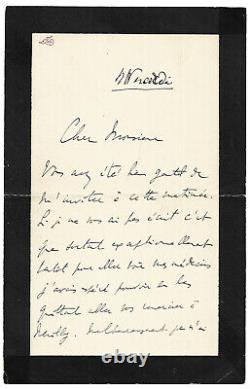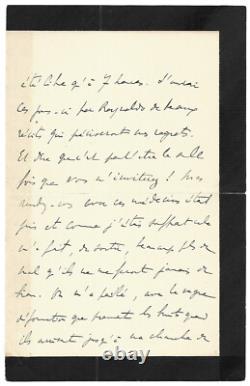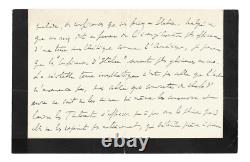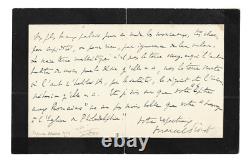
- Homepage
- Author
- Alfred Bruneau (3)
- Beydts (louis) (4)
- Camille Mauclair (3)
- Charles Monselet (3)
- Charles Wagner (3)
- Chateaubriand (5)
- Colette (3)
- Ernest Daudet (3)
- Eugène Labiche (3)
- Jean Couty (3)
- Jean-léon Gérôme (5)
- Louise Read (4)
- Marcel Proust (5)
- Paul Chabas (4)
- Paul Meurice (3)
- Proust (3)
- Roger Martin Du Gard (4)
- Salomon Reinach (3)
- Sully Prudhomme (7)
- Violette Leduc (4)
- Other (3998)
- Binding
- Era
- 18th Century (11)
- 1900 To 1960 (61)
- 1930s (4)
- 1960s (5)
- 1970s (7)
- 19th (5)
- 19th Century (48)
- 20th Century (15)
- Beautiful Era (12)
- Belle Epoque (49)
- First Empire (8)
- Nineteenth (19)
- Nineteenth Century (11)
- Post-war (21)
- Restoration (17)
- Revolution (4)
- Roaring Twenties (28)
- Second Empire (21)
- Second World War (5)
- World War Ii (9)
- Other (3713)
- Language
- Theme
- Type
Marcel PROUST / Autographed letter signed to R. De Montesquiou / Venice / Tintoretto






Autographed letter signed "Marcel Proust" to Robert de Montesquiou S. L, [September 7, 1904], 4 pp.
In-8°, bordered in deep mourning. Wet stamp of Robert de Montesquiou, with his monogram, at the upper left corner. Tears at the folds, typographic annotation in pencil on the fourth page. In an astonishing letter to his mentor, Proust delivers a sharp assessment of Italy and the preservation of its heritage.
"Dear Sir, You were very kind to invite me to this morning. If I haven't written to you, it's because, exceptionally going out to see my doctors, I had hoped to be able, after leaving them, to come thank you in Neuilly. Unfortunately, I was only free at 7 o'clock.
I will have, in the coming days, beautiful stories from Reynaldo that will specify my regrets. [According to the report in Le Figaro the next day, Hahn delighted the audience with his compositions].
And to think that this might be the only time you invite me! My appointments with these doctors were scheduled, and as I was unwell, going out caused me much more harm than they will ever do me good. I heard, through the vague distortion that sounds take when they reach my sickroom, about the conferences you would give in Italy. Despite what you told me in favor of the more effective evangelization of an aesthetically unappealing land like America, I think that the "Conferences in Italy" will be even more glorious.The true aesthetically unappealing land is not the one that art did not sow, but the one that, covered with masterpieces, neither knows how to love them nor even preserve them, and lets the Tintorettos fade gradually under the rain when it does not repaint them entirely, which destroys piece by piece its most beautiful palaces to sell the fragments, very expensively, out of greed, or for nothing, out of ignorance of their value. The true aesthetically unappealing land is not the virgin land in which art resides, at least by the desire it has for it, but the dead land where art no longer resides, due to the satiation, disgust, and misunderstanding it has for it. And I am sure that your Epistle to the Romans will be no less beautiful than your Message to the Church of Philadelphia [allusion to Montesquiou's trip to the United States the previous year]." The missed appointment by Proust seems to be the morning that Montesquiou holds at the Pavilion of the Muses in honor of the Italian writer Mathilde Serao, on Wednesday, December 7, 1904. This morning is announced in Le Figaro on Tuesday, December 6, 1904, and the report is given the day after in the same paper.
It is not surprising that Proust expresses insistently here strong feelings about Italy and its most illustrious Venetian painter, as his translation of Ruskin's The Bible of Amiens has just been published. Touched by the work of the English author (which he discovered in 1898 thanks to his friend Robert de Billy), Proust undertakes several "Ruskinian" pilgrimages while translating, assisted by his mother Jeanne Weil. He travels to northern France, to Amiens, and especially to Venice. He visits the lagoon city twice in 1900, once in April and again in November. The country, its history, its works. Proust's fascination with Italy is not limited to the chapter he devotes to it in In Search of Lost Time. It emanates from him, first and significantly, in the Ruskinian work. Did the writer learn of the monumental Paradise of the Tintoretto "detached" from the Doge's Palace in 1903 when he makes here a less than flattering criticism of how Italy preserves the paintings of its masters? Or is it an observation from his own experience of Venice and its surroundings?Be that as it may, the enthusiasm of American collectors for European paintings, those of "the virgin land in which art resides," had been thriving for many years. Robert de Montesquiou Robert Proust (who purchased all of his brother's letters after Montesquiou's death) Estate of Suzy-Mante Proust.
Robert Proust and Paul Brach, Plon, pp. 179-180, n°CLXXIV (incorrect transcription of one word) Correspondence, t.
